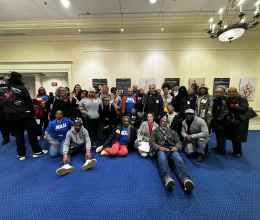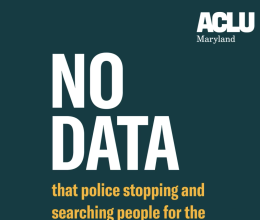
Learn more about ACLU v. Leopold
Contact: Meredith Curtis, 443-310-9946, media@aclu-md.org
ANNAPOLIS - In an important new ruling under untested privacy provisions of the Maryland Public Information Act (MPIA), the Maryland Court of Special Appeals has ruled that individuals have a right to seek justice under the law when public officials compile and use personal records about them without legitimate law enforcement purpose. The ruling came in the case of ACLU of Maryland v. John Leopold, in which a number of individuals are challenging Leopold's abuse of the Anne Arundel County Police Department, through his position as County Executive, to collect and compile personal information about his perceived political opponents into "dossiers." In addition to holding that people have a right to challenge collection of their information without good cause and to seek monetary damages under the MPIA, the Court also rejected claims that Leopold and former Police Chief James Teare could escape liability on these claims through assertion of immunity as public officials.
"This victory on behalf of individuals targeted for wrongful information gathering breathes life into a provision of our state's public information law, that has laid dormant for years," said Deborah Jeon, Legal Director for the ACLU of Maryland. "In so doing, the Court has put public officials on notice that this type of conduct is unlawful, helping to ensure that such abuses of power will not recur in the future."
Concerned that the "enemies list" revealed in the State's March 2, 2012 criminal indictment of Leopold violated the political freedoms of the list's targets, the ACLU in December of that year filed a lawsuit against Leopold, the County Executive's Office, and the County Police Department under a provision of the MPIA that prohibits the creation, use, and dissemination of government records containing personal information about private citizens without an adequate governmental need, as well as under provisions of the law prohibiting wrongful withholding of public information. The lawsuit charged that information was improperly collected and retained about Leopold's perceived political rivals or enemies, and that information was improperly withheld when requested by individuals who had reason to believe they were targeted.
"This court decision is an important win for civil rights and civil liberties," said plaintiff Carl O. Snowden. "Activism to the human rights movement is what air is to human beings. This decision reaffirms the right of citizens not to have the police and elected officials able to unlawfully compile dossiers for political purposes."
Rejecting arguments raised by the defendants, Judge Douglas R.M. Nazarian wrote for the Court:
"The act of compiling the dossiers is a ‘use' of the documents they contained under any sensible definition of the word, even if the documents were already in hand for some other purpose. The dictionary definition, ‘the act or practice of employing something,' Merriam-Webster Collegiate Dictionary 1378 (11th ed. 2011), already includes this notion of the term: the information put into the dossiers, once put there, was put to ‘use' in that new capacity. And Mr. Leopold ‘used' the records a second time when he looked to the information for campaign purposes. Without first having ‘clearly established' a need for the documents, Mr. Leopold should not have been ‘using' them at all, whether he wore his County Executive Hat or his Candidate Hat at the time."
Karen Toto of Wiley Rein, LLP, who argued the case, said: "It is gratifying to be able to provide pro bono assistance to the ACLU and our individual clients on this kind of precedent-setting case. The clients deserve credit for being willing to make and pursue claims in order to vindicate the important principles at issue in this case."
The plaintiffs are represented pro bono by Wiley Rein LLP Partner Richard A. Simpson and associates Karen Toto, Jennifer A. Williams and Meredith Singer, as well as ACLU of Maryland Legal Director Deborah Jeon and Senior Staff Attorney David Rocah.
PLAINTIFFS IN ACLU V. LEOPOLD
Jacqueline Allsup: President of the Anne Arundel County Branch of the NAACP.
Lewis A. Bracy: A former National Security Agency Law Enforcement Officer and community volunteer whose CJIS file was improperly accessed, on an Anne Arundel County Police Department computer, on October 30, 2008 by William H. Hyers, who has been a contract employee with Leopold's office since his retirement from the Anne Arundel County Police Department.
Karla R. Hamner and John M. Singleton: Hamner and Harris are former members of Leopold's staff who sued Leopold for sex discrimination and retaliatory termination in unrelated federal actions and have reason to believe that a dossier may have been compiled on them. Singleton represented Hamner and Harris in their lawsuits against Leopold.
Marvenise V. Harris: A Maryland state employee who filed a complaint in May 2009 alleging that Leopold insulted and sexually harassed her in the cafeteria line at her workplace. Retired Deputy Police Chief Emerson Davis testified before the County Council that shortly after Harris's complaint was made public, then-Chief James Teare showed him a file on Harris.
Eugene Peterson: A former member of the Anne Arundel County Board of Education who had past clashes with Leopold.
Thomas W. Redmond, Sr.: A former county councilman who had an illegal dossier compiled on him and whose CJIS file was improperly accessed on September 12, 2008 by Anne Arundel County Police Officer Timothy P. Phelan, a member of the Leopold's Executive Protection Unit.
Eric Lionel Martin Scott: An African American Sergeant in the County Police Department who had taken a leadership role in raising concerns about the need for increased diversity and discriminatory treatment suffered by minority officers in the department.
Mike Shay: Former Green Party candidate for Anne Arundel County Executive.
Carl O. Snowden: A long-time civil rights activist who had an illegal dossier compiled on him and whose NCIC file was improperly accessed on July 28, 2009, by Anne Arundel County Police Detective Patrick A. Donohue.
###





